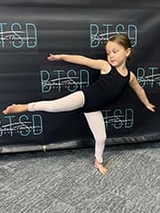Fetal Surgery for Spina Bifida: Mason’s Story
Fetal Surgery for Spina Bifida: Mason’s Story
Baylee and Louis have their hands full with three children, and they’re grateful for every second. Thanks to fetal surgery for spina bifida at Children’s Hospital of Philadelphia (CHOP), their daughter Mason, now 5, is exceeding all expectations and bringing joy to her family.

“Every pediatrician she sees says she’s not only surpassing every milestone, but if they did not know she had spina bifida, they would have no idea,” Baylee says.
Diagnosed with spina bifida
When Baylee was 19 weeks pregnant, she settled in for her anatomy scan with optimism. All of her prenatal screenings had come back normal, including the maternal serum alpha-fetoprotein blood test, which can signal possible neural tube defects.
But just seconds into the ultrasound, the technician’s demeanor changed. She noticed enlarged ventricles and a lesion in the baby’s spine. It appeared to be spina bifida, a birth defect in which the spinal column doesn’t form properly, leaving a section of spinal cord and nerves exposed through an opening in the back. Stunned by the news, the couple had to wait through the weekend to see a maternal-fetal specialist near their home in Jacksonville, FL.
On Monday, the specialist examined the ultrasound images and gave the couple his assessment.
“The first words out of his mouth were, ‘Unfortunately, your daughter is not looking too good. Her brain is abnormal in every way,’” Baylee remembers.
When the couple told him they would not consider terminating the pregnancy, he gave them two more options: Either proceed without intervention or find out if Baylee would qualify for fetal surgery at the Richard D. Wood Jr. Center for Fetal Diagnosis and Treatment at CHOP. They chose the latter.
Preventing damage to the developing spinal cord
It was the first time either Baylee or Louis had heard of fetal surgery for spina bifida, a delicate procedure in which fetal surgeons open the uterus and close the opening in the baby’s back. The surgery is performed between 19 and 25 weeks of gestation. Repairing the opening before the baby is born protects the spinal cord from continued exposure to amniotic fluid, which can cause progressive damage.
Two days after an amniocentesis showed no chromosomal abnormalities, which would have ruled out fetal surgery, Baylee and Louis packed their car and made the 12-hour drive north to Philadelphia. There, they underwent an extensive two-day evaluation. With the results in, CHOP Surgeon-in-Chief and Founder and Director of the Richard D. Wood Jr. Center for Fetal Diagnosis and Treatment, N. Scott Adzick, MD, MMM, FACS, FAAP, told them that Baylee and Mason were candidates for fetal surgery.
A combination of factors confirmed that Mason could benefit from prenatal repair, including the fact that she had developed hindbrain herniation. This is when the hindbrain descends into the upper portion of the spinal canal in the neck, which blocks the circulation of cerebrospinal fluid. This can cause hydrocephalus and injure the developing brain.
The couple drove home to Jacksonville full of hope and returned with their toddler, Louie, for the surgery. The family rented an apartment in Cherry Hill, NJ, and arranged for their parents to take turns caring for their son.
On Nov. 10, 2017, Dr. Adzick and neurosurgeon Gregory Heuer, MD, PhD, teamed up for the surgery. During an ultrasound the next day, Baylee was thrilled to see her baby wiggling her toes.
A welcome entrance

After several days in the Hospital, Baylee returned to the rented apartment for strict bedrest. A c-section was planned for Feb. 5, 2018, in CHOP’s Garbose Family Special Delivery Unit (SDU), but Baylee started having contractions five days ahead of schedule. One of the SDU’s attending high-risk obstetricians, Juliana Sanchez Gebb, MD, in consultation with the surgical team, decided to deliver the baby early.
Mason came into the world that day kicking and screaming — a welcome entrance considering the damage that spina bifida can do to the lower limbs, her mother remembers.
“These doctors are angels walking on earth,” Baylee says.
Less than a week later, the entire family returned home to Jacksonville. Mason’s care was transferred to a spina bifida clinic in Orlando. Her most recent MRI shows that her hindbrain herniation has been completely reversed.
Now 5 years old, Mason is thriving. She continues to exceed all expectations — she just started Kindergarten, is in her second year of dance, loves hair and makeup, and brings so much joy to her family, including her two little brothers.
"Her pediatrician is convinced she has the best outcomes of fetal surgery he has ever seen or heard of," says Baylee. "She's completely on track developmentally according to her physical therapist, who is also awed at Mason’s results and determination. Mason completed her last MRI without sedation and Dr. Heuer said she is doing wonderful."
'CHOP gave us hope'

When Baylee and Louis think back to how they felt when they were told their daughter might not survive, they want to tell other parents facing a dire prognosis not to give up hope.
“If you get a diagnosis of any kind, just know that there are people, there are doctors, there are places out there who can help you,” Baylee says. “You don’t have to choose the first option.”
"We were told in Jacksonville that Mason wouldn’t survive," she continues. "The team at CHOP gave us hope and gave Mason a voice — their hard work and dedication changed Mason’s life."
Updated August 2023